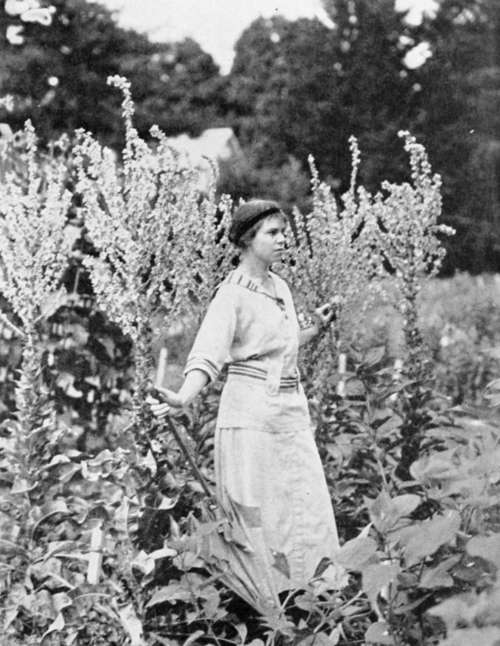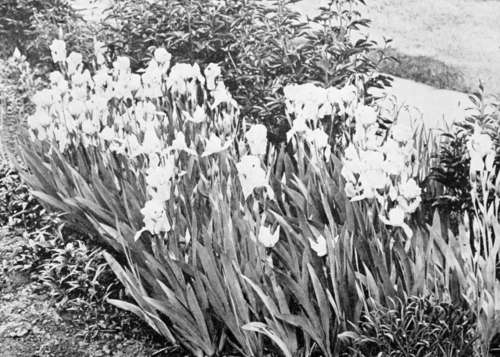Public Cemeteries And Public Gardens. Continued
Description
This section is from the book "Landscape Gardening", by Andrew Jackson Downing. Also available from Amazon: Landscape Gardening.
Public Cemeteries And Public Gardens. Continued
But this is not all; as if to show how far human infirmity can go, we noticed lately several lots in one of these cemeteries, not only inclosed with a most barbarous piece of irony, but the gate of which was positively ornamented with the coat of arms of the owner, accompanied by a brass doorplate, on which was engraved the owner's name and city residence! All the world has amused itself with the epitaph on a tombstone in Pere la Chaise, erected by a wife to her husband's memory in which, after recapitulating the many virtues of the departed, the bereaved one concludes with — "his disconsolate widow still continues the business, No. —, Rose-street, Paris." We really have some doubts if the disconsolate widow's epitaph advertisement is not in better taste than the cemetery brass doorplate immortality of our friends at home. — A. J. D.
We have already remarked that, in the absence of public gardens, rural cemeteries in a certain degree supplied their place. But does not this general interest, manifested in these cemeteries, prove that public gardens, established in a liberal and suitable manner near our large cities would be equally successful? If 30,000 persons visit a cemetery in a single season, would not a large public garden be equally a matter of curious investigation? Would not such gardens educate the public taste more rapidly than anything else? And would not the progress of horticulture as a science and an art be equally benefited by such establishments? The passion for rural pleasures is destined to be the predominant passion of all the more thoughtful and educated portion of our people, and any means of gratifying their love for ornamental or useful gardening will be eagerly seized by hundreds of thousands of our countrymen.
Let us suppose a joint-stock company formed in any of our cities for the purpose of providing its inhabitants with the luxury of a public garden. A site should be selected with the same judgment which has already been shown by the cemetery companies. It should have a varied surface, a good position, sufficient natural wood, with open space and good soil enough for the arrangement of all those portions which require to be newly planted.
* An interesting and significant comparison may be made between 1818 and the present. There are now several public parks and playgrounds in the United States where the annual attendance exceeds one million, and at least one where the figure reaches approximately five million. — F. A. W.

Fig. 46. Ornamental Mulleins IN a Public Garden.
Such a garden might, in the space of fifty to one hundred acres, afford an example of the principal modes of laying out grounds, thus teaching practical landscape gardening. It might contain a collection of all the hardy trees and shrubs that grow in this climate, each distinctly labelled, so that the most ignorant visitor could not fail to learn something of trees. It might have a botanical arrangement of plants and a lecture-room where at the proper season lectures on botany could be delivered, and the classes which should resort there could study with the growing plants under their eyes. It might be laid out so as, in its wooded position, to afford a magnificent drive for those who chose so to enjoy it; and it might be furnished with suitable ices and other refreshments, so that, like the German gardens, it would be the great promenade of all strangers and citizens, visitors, or inhabitants of the city of whose suburbs it would form a part.
But how shall such an establishment be supported? Cemeteries are sustained by the prices paid for lots, which, though costing not a large sum each, make an enormous sum in the aggregate.
We answer, by a small admission fee. Only those who are shareholders would (like those owning lots in a cemetery) have entrance for their horses and carriages. This privilege alone would tempt hundreds to subscribe, thus adding to the capital, while the daily resort of citizens and strangers would give the necessary income; for no traveller would leave a city possessing such a public garden as we have described without seeing that, its most interesting feature. The finest band of music, the most rigid police, the certainty of an agreeable promenade and excellent refreshments, would, we think, as surely tempt a large part of the better class of the inhabitants of our cities to such a resort here as in Germany. If the road to Mount Auburn is now lined with coaches, continually carrying the inhabitants of Boston by thousands and tens of thousands, is it not likely that such a garden, full of the most varied instruction, amusement, and recreation, would be ten times more visited? Fetes might be held there, horticultural societies would make annual exhibitions there, and it would be the general holiday-ground of all who love to escape from the brick walls, paved streets, and stifling atmosphere of towns.
Would such a project pay? This is the home question Of all the calculating part of the community, who must open their purse-strings to make it a substantial reality.
We can only judge by analogy. The mere yearly rent of Barnum's Museum in Broadway is, we believe, about S10,000 (a sum more than sufficient to meet all the annual expenses of such a garden); and it is not only paid, but very large profits have been made there. Now, if hundreds of thousands of the inhabitants of cities like New York will pay to see stuffed boa-constrictors and un-human Belgian giants, or incur the expense and trouble of going live or six miles to visit Greenwood, we think it may safely be estimated that a much larger number would resort to a public garden, at once the finest park, the most charming drive, the most inviting pleasure ground, and the most agreeable promenade within their reach. That such a project, carefully planned, and liberally and judiciously carried out, would not only pay. in money, but largely civilize and refine the national character, foster the love of rural beauty, and increase the knowledge of and taste for rare and beautiful trees and plants, we cannot entertain a reasonable doubt.
It is only necessary for one of the three cities which first opened cemeteries to set the example, and the thing once fairly seen it becomes universal. The true policy of republics is to foster the taste for great public libraries, sculpture and picture galleries, parks, and gardens, which all may enjoy, since our institutions wisely forbid the growth of private fortunes sufficient to achieve these desirable results in any other way.
Note. — Experience has hardly carried out Mr. Downing's ideas, perhaps for the very reason that, soon after the time of his writing, it became the general policy in America for cities to provide free public parks and playgrounds. However certain resorts have been maintained very successfully under corporate ownership, frequently as attractions for transportation companies; or they have been maintained, like Atlantic City and Coney Island, by the concessionaries. Mr. Downing's reasoning was sound; but Americans have simply found another route to the same objective. — F. A. W.

Fig. 47. German Iris in a Public Garden.
Continue to:
- prev: Chapter XXXVII. Public Cemeteries And Public Gardens
- Table of Contents
- next: Chapter XXXVIII. The New York Park
